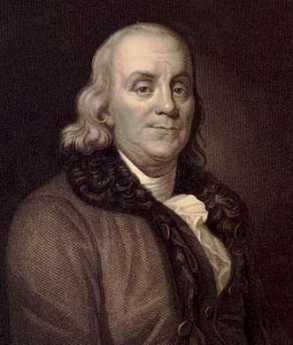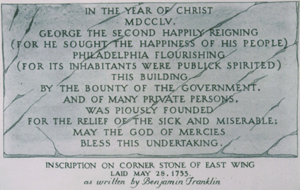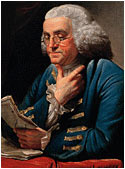Related Topics
Benjamin Franklin
A collection of Benjamin Franklin tidbits that relate Philadelphia's revolutionary prelate to his moving around the city, the colonies, and the world.

Volunteerism
The characteristic American behavior called volunteerism got its start with Benjamin Franklin's Junto, and has been a source of comment by foreign visitors ever since. It's still a very active force.
Foreign Affairs
This topic is under construction. Feel free to watch it evolve.
Pacifist Pennsylvania, Invaded Many Times
Pennsylvania was founded as a pacifist utopia, and currently regards itself as protected by vast oceans. But Pennsylvania has been seriously invaded at least six times.
Philadelphia People
New topic 2017-02-06 20:33:59 description
Franklin: Upstart Hero of King George's War (1747)
In 1747, Benjamin Franklin had a life-transforming experience, acting quite unlike his character before, or later. At that time, Old Europe was engaged in some distant tribal skirmishing which has come to be known as King George's War. King George II, that is, under whose rule Franklin in 1751 inscribed on the cornerstone of the Pennsylvania Hospital that Pennsylvania was flourishing, "for he sought the happiness of his people."

|
|
The cornerstone of the Pennsylvania Hospital inscribed by Franklin. |
Those distant commotions suddenly developed a harsh reality for the little pacifist sanctuaries on the Delaware River, when French and Spanish privateers suddenly raided and destroyed settlements on Delaware Bay. The Quaker Assemblies and their absentee Proprietor merely dithered and huddled in the face of what impended as a totally unexpected threat of annihilation of the pacifist colonies. It probably only seemed natural for the owner of the largest newspaper in the colony to publish a pamphlet called "Plain Truth," urging the inhabitants to rally to their own defense, and pressure their government to lead them. The Quaker leaders were in fact unable to readjust a lifetime of pacifist belief in a few days of an emergency, and the English Proprietor, then Thomas Penn, was far too remote to take active charge of matters. So, Franklin gave speeches, also an unfamiliar role for him, and finally brought out a detailed proposal for the creation of a Pennsylvania Militia. Ten thousand volunteers promptly signed up, elected Franklin as their Colonel; but he declined, and served as a common soldier.

|
| Benjamin Franklin in 1767. |
Against naval attack, the Militia needed cannon, which did not exist in the colony. So Franklin organized a lottery, raised three thousand pounds, and tried to buy cannon from Governor Clinton of New York. New York declined to sell, and so Franklin led a delegation to New York to negotiate. The negotiations largely consisted of getting Governor Clinton drunk and convivial, but they were successful, the artillery was shipped off to Philadelphia. Although they were undoubtedly grateful to Franklin for saving the day, this entirely extra-legal recruitment of an army badly rattled the Quakers and their Proprietor, since it demonstrated the ineffectiveness of their governance at a time of obvious crisis, and might ultimately have led to their overthrow. Franklin's heroic behavior seemed so threatening to Thomas Penn that he described him as "a dangerous man," acting like "the Tribune of the People."
When the underlying commotion in Old Europe subsided, the threat to the colonies disappeared, so the Militia disbanded in a year. Franklin seemed to be just as uncomfortable with his unaccustomed role as the governing leaders were, and he hardly ever mentioned it again. However, this is the sort of reflex leadership which makes political careers, and it surely influenced his decision to retire from business in 1748, run for election to the Assembly, and live like a gentleman. Seven years later, during the French and Indian War, he had become the chosen leader of the Pennsylvania Assembly, had much longer to think through what he was doing, and had learned how to organize a war. By that time, as the saying goes, he knew who he was. He was a man whose silent memories could flashback to that time when a bald fat printer stepped out of the crowd, saying "Follow me," and ten thousand men with muskets did so.
Originally published: Thursday, December 28, 2000; most-recently modified: Friday, September 20, 2019
| Posted by: Richard | Oct 13, 2007 10:44 AM |